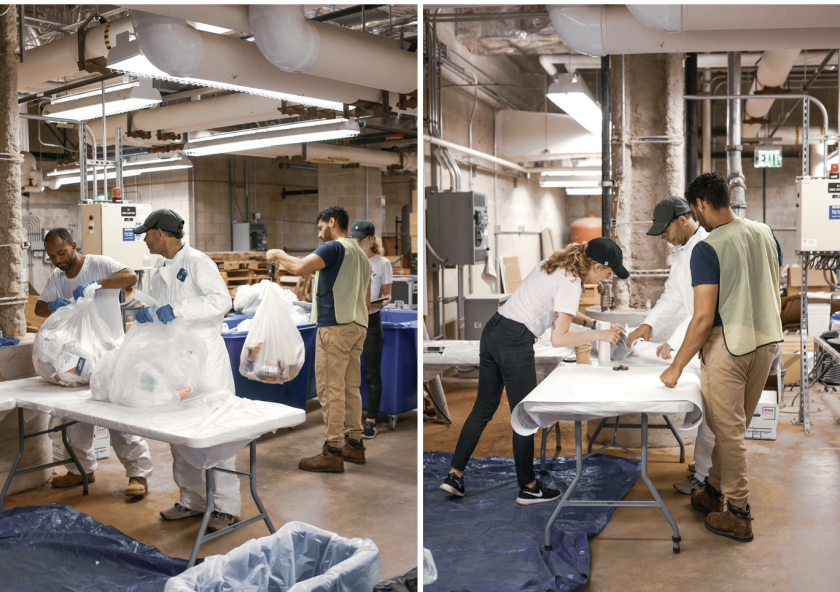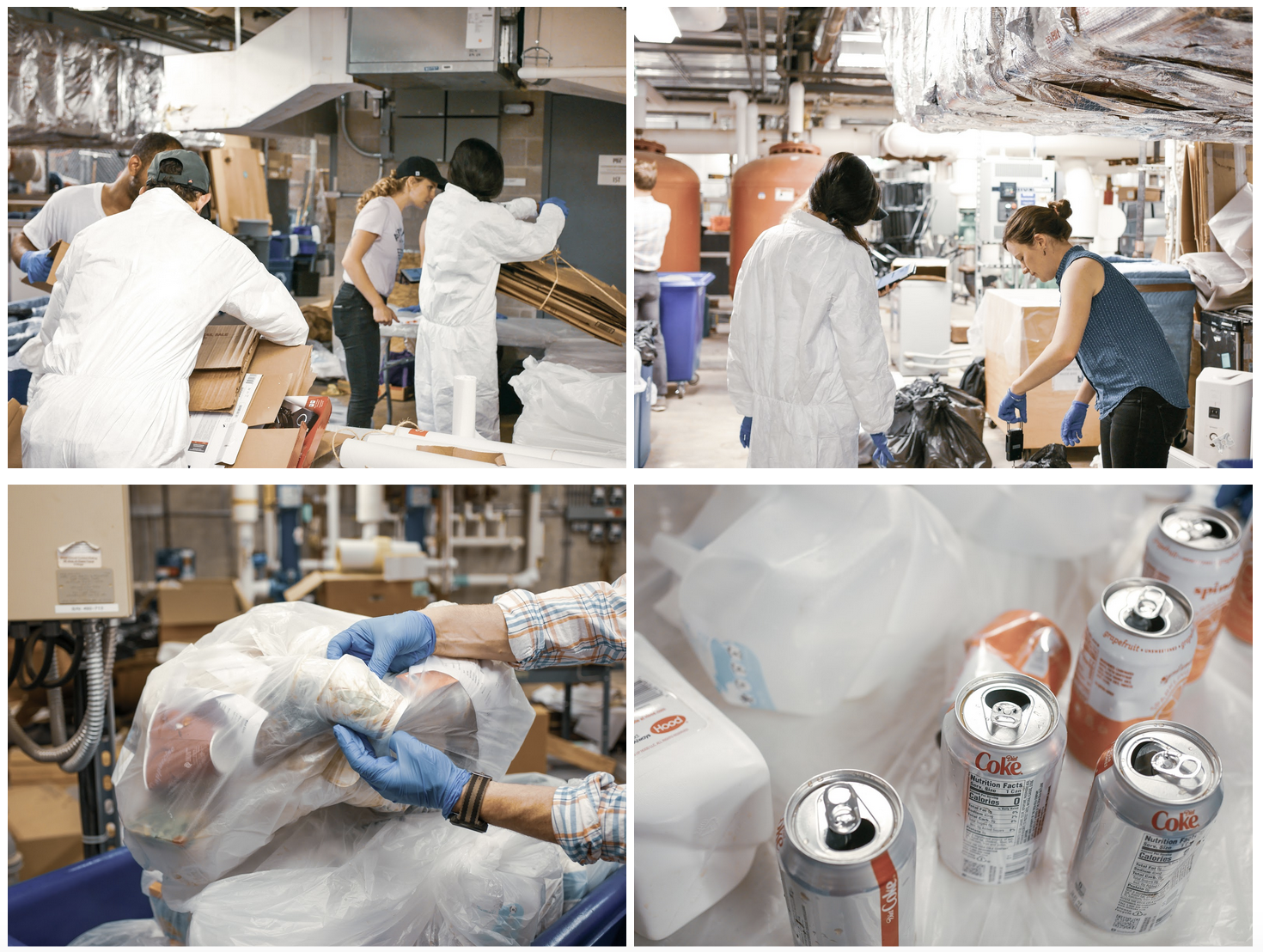
Materials matter: Launching a waste reduction pilot in the Media Lab

Knowing what and what not to recycle can be confusing for anyone. Though accidentally throwing a plastic glove or bag into a recycling bin doesn’t seem like a big deal, this small act can contaminate a load of recycling and potentially impact entire branches of the global materials management system. According to Waste Management, 1 in 4 items in a recycling bin are not actually recyclable, resulting in an average recycling contamination rate of 25% (Ocampo). A common misconception is that these contaminated items are sorted out once they get to the plant. In actuality, contaminated items may cause an entire bag, or even an entire truckload, of recycling to become designated as trash.
Launching a pilot with the Media Lab
MIT’s Office of Sustainability, Department of Facilities and the MIT Media Lab wanted to explore why contamination is so prevalent in recycling streams (i.e. contamination is putting things in recycling that don’t belong like food waste, coffee cups, straws, etc.). They teamed up and turned the Media Lab into a living laboratory to test methods for correcting recycling behaviors through infrastructure changes and an awareness campaign. In a pilot program headed by Brian Goldberg, a MITOS sustainability project manager, six lab groups implemented an experimental strategy to centralize the locations of their recycling, compost (organics or food waste collection), and trash bins—eliminating personal bins at each workstation.
Goldberg explains the challenge at the Media Lab is universal across campuses and communities: “The behavioral challenge in a building is how to simply and conveniently empower each person in the building to easily understand: 1) what material belongs in recycling, food waste, and trash bins; 2) where to find those bins without allowing people to just throw random stuff in. If we can solve these challenges at the scale of the Media Lab, then we can explore how to scale up the solutions across campus.”
{"preview_thumbnail":"/sites/default/files/styles/video_embed_wysiwyg_preview/public/video_thumbnails/PfyxFYDkVz4.jpg?itok=1FJAfbXJ","video_url":"https://www.youtube.com/watch?v=PfyxFYDkVz4","settings":{"responsive":1,"width":"854","height":"480","autoplay":0},"settings_summary":["Embedded Video (Responsive)."]}
Measuring the Impact
During the 5 month pilot program, custodians collected and monitored daily contamination levels of the recycling bins (i.e. presence of food waste in recycling) from the six test labs and offices. A waste audit was conducted before and after the pilot, which started to gather data and analyze the effects of the changes that had been made, in order to see if there was any correlation with better recycling and food waste collection practices.
Overall, the pilot program diverted 2,463.3 pounds of food waste towards soil production on regional farms—a waste material that had previously contaminated recycling bins or had been placed in the trash. The pilot also produced cleaner recycling streams with 6.5% less contamination (i.e. food waste and trash in the recycling bin) compared to before the pilot. Thus, the best practice of centralizing trash, recycling, and compost bins within an office or lab does correlate to an increase in better separation of wastes and an increase in the volume of food waste and recycling that can be recycled and reprocessed to feed circular economies. Furthermore, user confidence in recycling rose from 20% (pre-pilot) to 90% (post-pilot), so there was a significant mindset shift towards better trash, recycling, and compost practices.
These results provide a best practice template of material collection infrastructure and behavior practices and are already informing material flow strategies for existing and new construction on campus. The Media Lab leadership is now keen to continue testing approaches that design out waste from its operations, both by refining bin locations and quantity as well as by developing sustainable event planning guidelines for the 300+ annual catered events hosted in Media Lab spaces. Teaming with the Office of Sustainability and VPF Sourcing, the Media Lab is developing guidelines that empower event hosts with best practices for promoting zero and low waste catered events—largely through choosing reusable materials, right-sized ordering, and food waste collection.
Action Matters
Recycling Tips:
-
Some of the most commonly “misrecycled” items that should not be placed in the recycling bin include coffee cups, compostable cups and utensils, greasy pizza boxes, plastic bags, wax-lined cartons, chip bags, and plastic straws. Pay special attention to keep these out of the recycling bin (Albeck-ripka).
-
When in doubt, it’s best to err to the trash can, since an incorrectly recycled item can have huge ramifications.
-
Remember to rinse out bottles and cans before putting them into recycling.
-
Learn about your local recycling practices to properly identify recyclable materials.
-
Recycle clean, dry paper; not wet, soiled paper.
-
Empty out everything before throwing it into the bin!
Improved labeling and public awareness campaigns may help change some behaviors, but it’s still ultimately up to each individual to be vigilant and educated about recycling in order for the process to be effective and impactful. When people recycle correctly, it not only helps the environment, but also can create new jobs and save millions of dollars in operations (Ocampo). Your actions really do matter, especially when it comes to recycling.

Sources:
Albeck-ripka, Livia. “6 Things You're Recycling Wrong.” The New York Times, The New York Times, 29 May 2018, www.nytimes.com/2018/05/29/climate/recycling-wrong-mistakes.html.
Jennison, Céline. “Compostable (Worse Than Plastic?).” ECOlunchbox, 19 Jan. 2018, www.ecolunchboxes.com/blogs/news/when-compostable-is-sometimes-worse-than-plastic.
Ocampo, Josh. “Americans Are Terrible at Recycling - This Is What Happens When You Put Something in the Wrong Bin.” Mic, 7 May 2019, www.mic.com/articles/190974/americans-are-terrible-at-recycling-this-is-what-happens-when-you-put-something-in-the-wrong-bin#.1wlEFdV1X.
Rachelson, David. “14 Recycling Contamination Facts That Will Blow Your Mind.” Commercial Garbage & Waste Management Company | Rubicon Global, 27 Feb. 2019, www.rubiconglobal.com/blog-14-recycling-contamination-facts/.
“The Truth About Bioplastics: Green(Washing) Is the New Black.” Debris Free Oceans, 22 Jan. 2019, www.debrisfreeoceans.org/the-truth-about-bioplastics-greenwashing-is-the-new-black.

